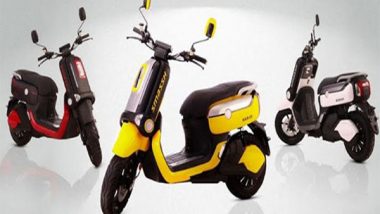New Delhi [India], September 21 (ANI): In a step towards enhancing last-mile connectivity with public transportation, the Delhi government has invited proposals for the deployment of 3,000 high-speed e-scooters, low-speed e-scooters, and e-cycles.
This move is part of the Public E-Scooter Sharing (PeSS) System and Public E-Cycle Sharing System (PeCS) initiative, aimed at providing a cost-effective and eco-friendly mobility solution for the residents of the national capital.
Also Read | Crypto Job Market Dips in India by 64.20% After Seeing Growth in Past Three Years: Report.
Commenting on this development, Transport Minister of Delhi Kailash Gahlot said "I am delighted to announce a significant step forward in our mission to enhance the urban mobility experience and last-mile connectivity in Delhi. The Delhi government, under the visionary leadership of Chief Minister Arvind Kejriwal, has embarked on an innovative journey to introduce a Public E-Scooter Sharing (PeSS) System and Public E-Cycle Sharing System (PeCS) in the Dwarka sub-city. The heart of this initiative lies in our commitment to providing affordable, eco-friendly, and efficient last-mile connectivity options to complement our existing public transport infrastructure, including the Metro and buses,” he said further.
“We understand the importance of last-mile connectivity in making public transportation more accessible and convenient for everyone. With this in mind, we have invited proposals from potential service providers for the deployment of high-speed e-scooters, low-speed e-scooters, and e-cycles." He added.
Also Read | Jammu and Kashmir: World's Largest Cedar Tree Found in Doda's Bhaderwah Forest, Say Officials (Watch Video).
The project envisions the deployment of a total of 3,000 electric vehicles (EVs) across 90 locations in the Dwarka sub-city in three phases. Phase 1, set to launch with 1500 vehicles, will include high-speed e-scooters, low-speed e-scooters, and e-cycles. Phase 2 will introduce an additional minimum of 750 vehicles, while Phase 3 will complete the deployment of the remaining 750 vehicles, with the condition that they be offered for long-term hiring or rental. Bidders will have the flexibility to operate different EV variants based on demand.
The timeline for implementation consists of 6 months for Phase 1, 4 months for Phase 2, and 4 months for Phase 3, followed by a 7-year period for operations and maintenance. The estimated project cost is 18 Crore INR.
Bidders are expected to propose a per-minute user charge, subject to a minimum usage of 10 minutes. The quantity split provision is set at a ratio of 60% high-speed e-scooters and low-speed e-scooters to 40% e-cycles, with a cap on user charges to ensure affordability for users.
To be eligible, bidders must be Original Equipment Manufacturers (OEMs), authorized dealers of OEMs, or Fleet Aggregators of E-scooters or e-cycles. They must meet a set of technical requirements and achieve a minimum score of 70 marks to qualify. Proof of Concept (PoC) with two operational vehicles at site conditions is also a prerequisite.
The introduction of a public e-scooter and e-cycle sharing system is expected to bolster the use of public transport in the Dwarka sub-city by providing essential last-mile connectivity options, thereby expanding the reach of the region's transit systems.
This initiative aligns with the Kejriwal Government's commitment to provide sustainable last-mile connectivity and improve the overall urban mobility experience for its residents. It is poised to revolutionize the way Delhiites commute within the city and contribute to a greener and more connected future. (ANI)
(This is an unedited and auto-generated story from Syndicated News feed, LatestLY Staff may not have modified or edited the content body)













 Quickly
Quickly

















